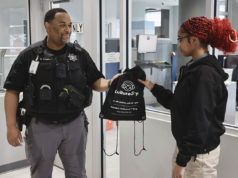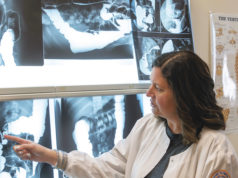By Christy Rosell
Some people are moving forward with life post-quarantine. Others remain fearful of exposing themselves to the virus, shunning even the thing that can help them stay healthy and have a great quality of life: medical care.
An extensive, worldwide survey1 published in the European Heart Journal found that the number of patients who sought care for heart attacks dropped by more than 50 percent in the early months of the pandemic. Another large study2 found that vaccination interruption could put 80 million babies at risk of getting deadly diseases like measles and polio.
While these are global findings, Georgia healthcare providers are seeing the same unfortunate trends. Halfway into this year of pandemic-related changes that have turned lives upside down, it’s easy to understand why many of us are tired of “corona-talk.” But we need to talk about staying healthy. This article will explore the important steps local healthcare providers are taking to ensure the care you need is a safe experience, whether it’s emergency or preventative care, surgery or even aesthetic procedures, which are in surprising demand thanks to the growing popularity of virtual meetings.
Care for children shouldn’t wait
“I always say that parents know their kids best and can tell when something is wrong,” said Dan Salinas, M.D., who serves as the chief medical officer at Children’s Healthcare of Atlanta.
He credits families with continuing to seek medical care for serious conditions or injuries during the COVID-19 pandemic. However, he’s concerned about a decline in important preventive care such as immunizations, annual checkups, and sports physicals. “My biggest piece of advice to parents right now regarding general care is don’t delay vaccinations, well-child visits, or sports physicals,” he said. “To help curb outbreaks of vaccine-preventable diseases, it’s so important to stay on schedule with shots for kids of any age, from babies to teens, especially as we approach flu season this fall.”
He added that immunizations and physicals need to be up-to-date to meet school requirements as kids return to school.
And, for any scheduled or emergent visits across Children’s facilities, safety measures including health screenings, masks, online check-in, and dedicated “clean teams” are in place. Only one caregiver is allowed with each patient during a visit to reduce the number of people inside the facilities. Floor decals in high-traffic areas help everyone stand six feet apart.
“It’s been encouraging to hear our families say how comfortable and safe they have felt at Children’s during recent visits,” Dr. Salinas said.
Like most health providers, Children’s now offers virtual appointments. More information is available at choa.org/virtualvisit.
Visit your physician’s office safely — or virtually
“Thankfully, our office has remained open through this pandemic,” said Christina Powers, M.D., an internal medicine physician at Medical Associates of North Georgia, a Northside network provider. Precautions to protect patients and staff include limiting people in the waiting room, temperature checks for both patients and employees, and mandatory mask-wearing.
“It is important to stay as healthy as possible and continue to be compliant with all of your medications and doctors’ visits to prevent your immune system from becoming weak,” she said.
For patients at high risk, Powers and her colleagues can meet with them through a virtual portal or by phone. “This has been especially helpful with our sick visits,” she said. “We can still see and evaluate them and direct them to drive-up testing, call in medication for them, or direct them to the ER if warranted. This is all done in the comfort of their home.”
She also finds it important to address patients’ mental health concerns that may relate to the pandemic. “Taking care of ‘all of you’ is a number-one priority for me as a doctor,” she said. “If there are gaps in your mental, physical or spiritual health, it can manifest in unhealthy ways. We try as physicians to identify the problems and get people to feel their best. So, if any of these aspects seem unbalanced, it might be worth talking to your doctor about it.”
Safety first in emergency departments and surgery centers
“What we have seen across the country and at Wellstar Health System is a 40-50 percent decrease in Emergency Department visits, and that includes patients experiencing stroke, heart attacks, and who need emergency surgeries,” said Vik Reddy, M.D., chief medical officer for Wellstar Kennestone Hospital. “I’m worried about people delaying care and having worse outcomes.”
Essentially, if patients who stay home survive, they could experience heart failure or permanent disability. “Delaying treatment may result in an irreversible condition that can have a more dramatic impact on your health than catching COVID-19,” Dr. Reddy said.
When Georgia Gov. Brian Kemp began reopening the state in April, Wellstar was among local health systems that reopened access to time-sensitive, essential surgeries for medical issues that will cause problems if left unchecked, such as the removal of lesions or polyps in the colon, or symptomatic gall stones or hernias.
William Mayfield, M.D., chief surgical officer for Wellstar Health System said patients who need these types of surgeries will likely not set foot in the hospital for the procedure. Wellstar moved outpatient procedures to ambulatory surgery centers such as Wellstar East Cobb Health Park and Wellstar Vinings Health Park. “There has been a tremendous amount of work on new processes and policies to ensure the safety of our facilities,” Dr. Mayfield said. “Wellstar has taken significant precautions to prevent the spread of COVID-19 and protect our patients and team members.”
Some precautions include testing surgery patients for COVID-19 several days before surgery. The system has also ramped up telehealth, with an estimated 50,000 virtual visits between late March and end of May. “Your doctor comes to you, wherever you are,” Dr. Mayfield said. “Patients that I have interviewed by video love the fact they don’t have to come in. Virtual visits are a huge patient satisfier.”
The surprising demand of facial procedures
Seth A. Yellin, M.D., F.A.C.S. is founder and director of Marietta Facial Plastic Surgery, Laser & Aesthetics Center. One of the many treatments he is well-known for is Injecta-Lift, which reshapes the face with injectable fillers to improve facial symmetry and self-confidence. He also performs surgical rejuvenation such as facelifts, blepharoplasty (cosmetic eyelid surgery) and rhinoplasty.
When his office closed in the early weeks of the state shut-down, he offered new patient consultations using a HIPAA-compliant virtual platform and launched a weekly, hour-long webinar series to discuss various facial aesthetic procedures. He also launched a new skincare website with a home delivery option (MariettaDermSkincare.com) so patients could access skincare products.
“Maintaining healthy habits such as skincare during times of stress helps to create a sense of normalcy,” he said.
When the office reopened, Dr. Yellin and a reduced support staff saw patients two days per week. They adopted practices such as floor markings to encourage physical distancing, enhanced disinfection, asking patients to wait in their cars instead of the waiting room and increasing the amount of time for appointments to reduce overlapping patients.
There was higher patient demand than he expected. A friend of Dr. Yellin’s was less surprised, saying, “‘All my colleagues are commenting on how bad they look on Zoom. In reality, we’re in this weird circumstance where people stare at each other’s faces for longer than we normally would.’”
During the shutdown, no employees were terminated and furloughed hourly employees received bonuses. In June, the full staff returned along with three newly hired team members. “The emotional impact of looking and feeling good is part of self-care,” he said. “It’s an important part of what we should be doing during this crazy time we’re in.”
Resources
1) 2020, May 29. “STEMI admissions during COVID-19: An ESC survey on ST-elevation myocardial infarction (STEMI) admissions during the pandemic.” Retrieved from European Society of Cardiology: www.escardio.org/Education/COVID-19-and-Cardiology/esc-survey-on-stemi-admissions-during-covid-19
2) Hoffman, Jan. 2020, May 22. “Polio and Measles Could Surge After Disruption of Vaccine Programs.” Retrieved from The New York Times: www.nytimes.com/2020/05/22/health/coronavirus-polio-measles-immunizations.html
————-
Caring for caregivers
Caregivers working in this stressful healthcare environment during a pandemic may struggle with stress and anxiety.
To ease some of the burden on their frontline workers, Northside team members can attend a virtual support group called “Face COVID.” Human Resources offers stress management tips and provides “Monday motivation” to help employees stay positive.
Children’s Healthcare of Atlanta offers its team daily support meetings, one-on-one staff support and visits with Lotus, a dog who provides pet therapy to patients.
Among Wellstar’s employee programs, it has established a COVID-19 Caregiver & Workforce Helpline and implemented a crisis care program that helps employees with child, elder and pet care.
———–
Med Team Tips to Live Your Best
*Some of these quotes have been edited for brevity.
1. Stay optimistic and stay connected. “You have to remain optimistic. We as individuals have overcome many obstacles. Maximize the benefits of being with your family and kids, of not running around to every basketball game. Stay in touch with family and friends with video.” – William Mayfield, M.D., chief surgical officer for Wellstar Health System
2. Exercise. “Stay fit and active. You don’t need more than a 5×5 foot area for exercise.” — Seth A. Yellin, M.D., Marietta Facial Plastic Surgery, Laser & Aesthetics Center
3. Reach for the crayons (they’re not just for kids). “Try creative coping strategies such as coloring, drawing or painting, playing an instrument or even breaking out some Play-Doh.” — Dr. Dan Salinas, Chief Medical Officer, Children’s Healthcare of Atlanta
4. Sleep well. “Sleep deprivation can negatively affect your immune system. Making sure we have a good sleep environment and prioritizing time to sleep will help us stay healthy in the long run.” — Christina Powers, M.D., Medical Associates of North Georgia, Northside network provider
5. Maintain a balanced diet. “The quarantine 15 is a real thing. People tend to gravitate to unhealthy food choices (junk food, alcohol) to deal with anxiety. A well-balanced meal can make people feel better emotionally and physically rather than binging on chocolate or alcohol.” — Christina Powers, M.D., Medical Associates of North Georgia, Northside network provider
6. Try something new. “This is a good time to do something you’ve always wanted to do.” — Seth A. Yellin, M.D., Marietta Facial Plastic Surgery, Laser & Aesthetics Center
7. Control what you can control. “It has not been uncommon to feel a loss of control because of so many external factors. I have tried to focus on the things that I can control — being present with my family, taking care of myself and contributing to the overall health of the community by observing shelter-in-place orders, social distancing recommendations, masking in public and handwashing.” — Dr. Dan Salinas, Chief Medical Officer at Children’s Healthcare of Atlanta
8. Socialize responsibly. “I had some friends in the back yard where we sat in lawn chairs apart. We all brought our own beverage and sat in-person for an hour. You need to have moments where you’re staying safe and balancing social interaction. We rely on that. Even my young kids, they thrive on their peers. We are not robots.” — Vik Reddy, M.D., chief medical officer for Wellstar Kennestone Hospital
9. Help someone. “Helping others has always been stress relieving for me, I think that is a main reason why I became a physician!” — Christina Powers, M.D., Medical Associates of North Georgia, Northside network provider
10. Call your doctor.
11. “Notify your child’s pediatrician if you have concerns that your child may be exhibiting significant anxiety or sadness/depression.” — Dr. Dan Salinas, Chief Medical Officer at Children’s Healthcare of Atlanta
12. “If anxiety and depression is becoming a problem, do not hesitate to contact your primary care physician. We are here to help!” — Christina Powers, M.D., Medical Associates of North Georgia, Northside network provider




